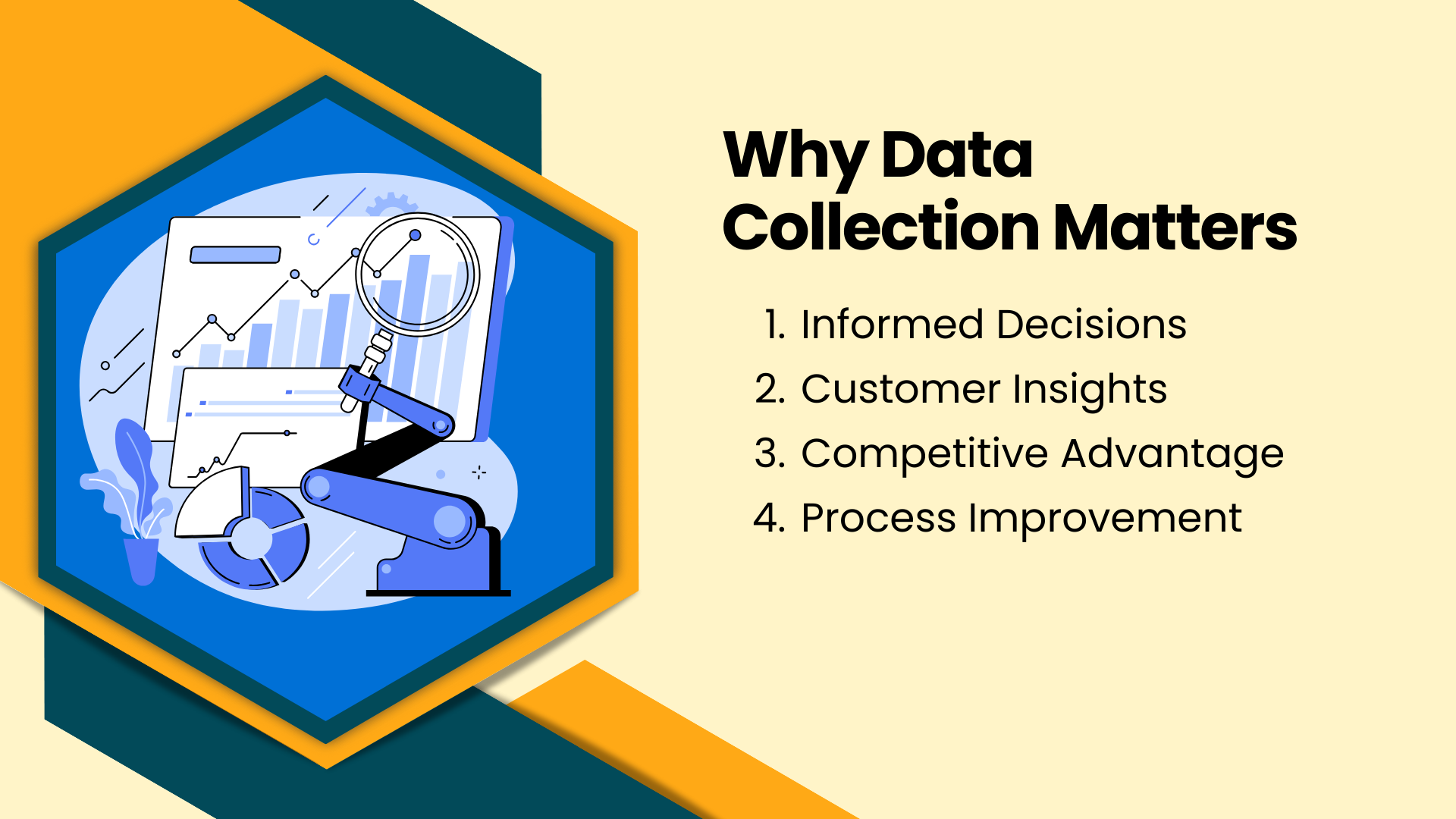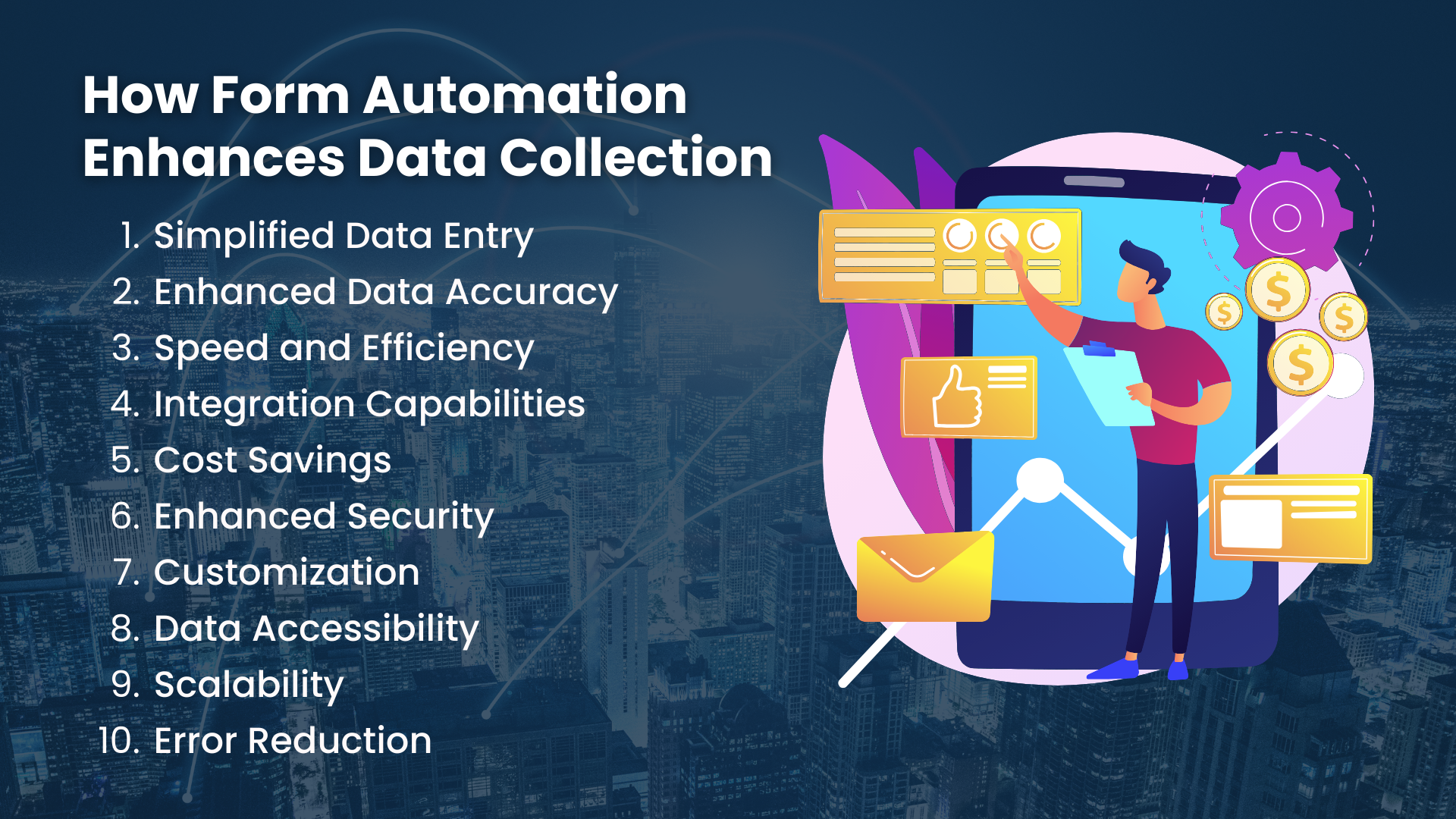
Do you wish there was a way to enhance the accuracy and efficiency of your data collection process? If so, you’re in the right place. In this blog, we’ll delve into the compelling reasons why your business should consider data collection with form automation. From saving time and reducing errors to unlocking valuable insights, form automation has the potential to revolutionize your data collection practices. The ability to collect, analyze, and leverage data effectively can mean the difference between success and failure. In this article, we’ll explore the critical role that data collection plays in modern business operations and how form automation can significantly enhance this process.
The Power of Data in Business
Data is the lifeblood of any successful business. It provides insights, drives decision-making, and enables companies to adapt to ever-changing market conditions. Here are some key reasons why data collection is vital for business:

Informed Decision-Making
In a rapidly evolving business landscape, decisions need to be well informed. Data-driven decision-making allows companies to understand their customers, market trends, and internal operations better. This insight enables executives to make strategic choices that lead to growth and profitability.
Customer Understanding
Understanding your customers is essential for tailoring products and services to their needs. Data collection through various touchpoints helps businesses gain insights into customer preferences, behaviors, and pain points. This knowledge is invaluable for building lasting customer relationships.
Competitive Advantage
In today’s competitive environment, staying ahead is a constant challenge. Effective data collection and analysis provide a competitive edge by identifying emerging trends, market gaps, and opportunities that others might miss.
Process Improvement
Data collection isn’t just about customers; it’s also about internal operations. Businesses can identify inefficiencies, streamline workflows, and reduce costs by tracking processes and operations. This continuous improvement cycle is crucial for long-term success.
Also Read: Top Forms Automation Tools
Benefits of Data Collection with Form Automation
Now that we’ve established the importance of data, let’s delve into the world of form automation and how it contributes to efficient data collection.

Simplified Data Entry
Traditional data collection methods often involve manual data entry, which is time-consuming and error-prone. On the other hand, form automation simplifies this process by allowing data to be directly input into digital systems. This reduces the risk of human error and accelerates data collection.
Enhanced Data Accuracy
Data accuracy is paramount. Inaccurate data can lead to flawed decisions and wasted resources. Form automation tools validate data in real-time, ensuring that only accurate information is collected. This reliability is essential for trustworthy business insights.
Speed and Efficiency
In business, time is money. Form automation accelerates data collection processes, enabling rapid decision-making. Whether it’s customer surveys, employee feedback, or sales leads, automating forms significantly reduces the time it takes to gather and process data.
Integration Capabilities
Form automation solutions can seamlessly integrate with existing software and systems. This means that data collected through forms can easily be transferred to databases, analytics tools, and customer relationship management (CRM) systems, ensuring that all departments can access up-to-date information.

Also Read: Tips for Successful Form Automation Implementation
Implementing Form Automation in Your Business
If you’re convinced of the benefits of form automation for data collection, it’s time to explore how to implement it effectively within your organization.
Identify Your Needs
Start by identifying the specific data collection needs of your business. Which processes can be streamlined, and where can automation make the most significant impact? Understanding your objectives is the first step to success.
Choose the Right Tools
Selecting the right form automation tools is crucial. Consider factors such as user-friendliness, scalability, and integration capabilities. Ensure that the chosen solution aligns with your business goals and budget.
Training and Adoption
Introducing new technology to your organization requires proper training and change management. Ensure that your team is well-equipped to use the automation tools effectively. Promote a culture of data-driven decision-making.
Continuous Improvement
Form automation is not a one-time endeavor. Regularly assess the effectiveness of your data collection processes and look for opportunities to optimize and enhance the use of automation tools.
Also Read: Essential features of every Form Automation Software
Conclusion
In the digital age, data collection is non-negotiable for businesses. It’s the foundation of informed decision-making, customer understanding, competitive advantage, and process improvement. Form automation, with its ability to simplify data entry, enhance accuracy, and improve efficiency, is a critical tool for modern businesses looking to stay ahead in their respective industries.
Implementing form automation effectively can transform your data collection processes and position your business for success. As you embark on this journey, remember that the ability to harness data is a superpower that can propel your business to new heights.
So, whether you’re a startup looking to gain a competitive edge or an established company aiming to optimize your operations, embracing form automation is a step in the right direction. It’s time to make data work for you to stay at the forefront of your industry.
Frequently Asked Questions(FAQs)
Q. What is form automation and its impact on data collection?
Form automation involves using technology to digitize and streamline the process of collecting and managing data through forms, such as surveys and questionnaires. Its impact is substantial, as it enhances efficiency by reducing manual data entry, improves accuracy, makes data more accessible, and often includes data analysis tools, all of which contribute to more effective and error-free data collection.
Q. Why is form automation crucial for data gathering in various sectors?
Form automation is critical for data collection in diverse sectors due to its ability to save time, enhance accuracy, reduce costs, ensure data security, and facilitate data analysis. Whether in healthcare, finance, education, or other fields, the benefits of form automation lead to more efficient, reliable, and cost-effective data collection processes.
Q. What are the key benefits of automated data forms?
The key benefits of automated data forms include time and cost savings, improved data accuracy, enhanced data security, and streamlined data analysis. Automation reduces the need for manual data entry, reducing errors, and making data more readily available. Automated systems also often include tools for data analysis, helping organizations derive valuable insights from collected data.
Q. How does form automation adapt to industry-specific needs?
Form automation adapts to industry-specific needs through customization. Businesses and organizations can tailor automated forms to collect data that is pertinent to their particular sector. This flexibility allows for the efficient collection of industry-specific data, ensuring that the technology can address the unique requirements of different fields, from healthcare and finance to education and manufacturing.
Q. Which tools are popular for data collection automation?
Popular tools for data collection automation include no-code and low-code platforms like Quixy. These platforms offer a variety of features & customization options to cater to different data collection needs in various industries. No-code and low-code platforms like Quixy enable users to build customized data collection solutions with minimal coding, making them versatile choices for businesses seeking flexibility and rapid development.
Subscribe
Login
Please login to comment
0 Comments
Oldest















